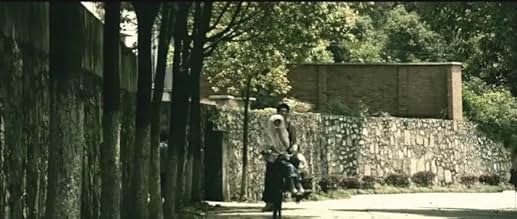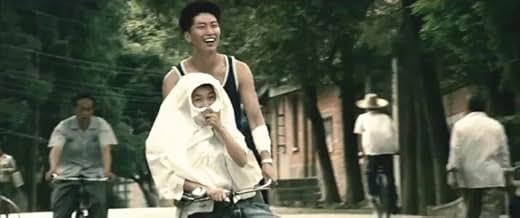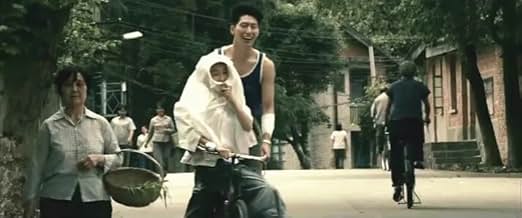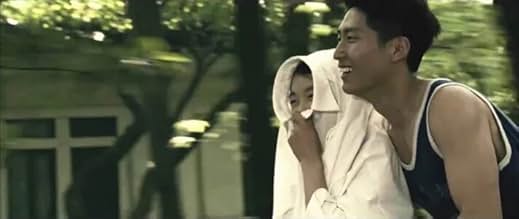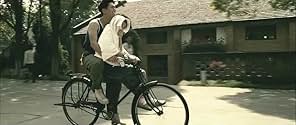AVALIAÇÃO DA IMDb
7,1/10
4 mil
SUA AVALIAÇÃO
Adicionar um enredo no seu idiomaRomance sparks between a young woman and a young man from different economic backgrounds during China's Cultural Revolution of the 1960s and '70s.Romance sparks between a young woman and a young man from different economic backgrounds during China's Cultural Revolution of the 1960s and '70s.Romance sparks between a young woman and a young man from different economic backgrounds during China's Cultural Revolution of the 1960s and '70s.
- Prêmios
- 10 vitórias e 12 indicações no total
Jinsong Wang
- Director Li (Li Zhuren)
- (as Qi Ke)
Liping Lü
- Wei's Mother (Weihong Muqin)
- (as Liping Lv)
Avaliações em destaque
In some restaurants, the chef goes out of his way to create complex dishes, with intricate combinations of tastes, colours and cooking styles. Others specialize in simple dishes, that stand out because of the quality of the ingredients. A simple pasta pesto can be a treat if it's made with the best olive oil, freshly grated parmesan and homegrown basil.
Under the Hawthorn Tree is like such a simple, but delicious dish. It's a straightforward story of a forbidden love, told in a basic way, without many frills. But Zhang Yimou is such a craftsman, that he doesn't need much to make a great movie.
The story is set during the cultural revolution, a period of ruthless oppression by the communist regime. The young girl Jing is being watched by the authorities because her father was a 'reactionary' and she risks losing her job as a teacher. During a trip to the countryside she falls in love with Sun. Her mother is afraid the affair will harm Jing's future career, and she forbids the two lovers to see each other.
Zhang Yimou tells the story in a simple way, focusing on the two lovers. He uses title cards to make the story go forward, a smart move because it prevents the script from having to explain too much. In this way, Zhang concentrates on the story of Jing and her lover Sun, and nothing else.
China in the seventies was a country where people led simple lives. Zhang emphasizes this by using simple props, like a goldfish key-chain made of yarn and beads, or a metal bowl with a special decoration. The hawthorn tree from the title also has a symbolic meaning, and in the very last image of the movie, when we see the tree blossoming, Zhang has an unexpected surprise that will make you smile.
The acting is wonderful. The two leads tell just as much with their eyes, their laughs and their expressions as with their words. Take for example the scene where Jing gives her goldfish to Sun, and the camera lingers on their faces to show us how they feel. Wonderful film making.
With this film, Zhang Yimou returns to his earlier style of film making, telling stories about the daily life in China. Under the Hawthorn Tree has more in common with his lesser-known films like Not One Less or The Road Home, than with his visually more spectacular films like The House of Flying Daggers, or even Raise The Red Lantern.
Some people may be disappointed by the slow story, in which nothing spectacular happens. But some of history's greatest film classics are slow and subtle. In a way, Under the Hawthorn Tree made me think of David Lean's classic Brief Encounter, another story about a forbidden love, that stands out because of the impeccable directing and acting.
Under the Hawthorn Tree is like such a simple, but delicious dish. It's a straightforward story of a forbidden love, told in a basic way, without many frills. But Zhang Yimou is such a craftsman, that he doesn't need much to make a great movie.
The story is set during the cultural revolution, a period of ruthless oppression by the communist regime. The young girl Jing is being watched by the authorities because her father was a 'reactionary' and she risks losing her job as a teacher. During a trip to the countryside she falls in love with Sun. Her mother is afraid the affair will harm Jing's future career, and she forbids the two lovers to see each other.
Zhang Yimou tells the story in a simple way, focusing on the two lovers. He uses title cards to make the story go forward, a smart move because it prevents the script from having to explain too much. In this way, Zhang concentrates on the story of Jing and her lover Sun, and nothing else.
China in the seventies was a country where people led simple lives. Zhang emphasizes this by using simple props, like a goldfish key-chain made of yarn and beads, or a metal bowl with a special decoration. The hawthorn tree from the title also has a symbolic meaning, and in the very last image of the movie, when we see the tree blossoming, Zhang has an unexpected surprise that will make you smile.
The acting is wonderful. The two leads tell just as much with their eyes, their laughs and their expressions as with their words. Take for example the scene where Jing gives her goldfish to Sun, and the camera lingers on their faces to show us how they feel. Wonderful film making.
With this film, Zhang Yimou returns to his earlier style of film making, telling stories about the daily life in China. Under the Hawthorn Tree has more in common with his lesser-known films like Not One Less or The Road Home, than with his visually more spectacular films like The House of Flying Daggers, or even Raise The Red Lantern.
Some people may be disappointed by the slow story, in which nothing spectacular happens. But some of history's greatest film classics are slow and subtle. In a way, Under the Hawthorn Tree made me think of David Lean's classic Brief Encounter, another story about a forbidden love, that stands out because of the impeccable directing and acting.
Zhang Yimou returns to a more basic form of film-making in this touching story of innocent love from China's Cutural Revolution era. Very strong performances add substance to an otherwise simple story of young lovers burdened by societal difficulties in their efforts to be together. Ms. Zhou is very good in her role as a young, innocent woman who meets a special boy, Shawn Dou, amid the turbulence of China's revolutionary years. Both girl and boy are sent to the country-side to labor under Mao's crazed design for social re-ordering. The film does not focus so much on the madness of the times as on the fear of being labeled politically incorrect which, coupled with the socially conservative norms of traditional China, serve to encumber the innocent desire to be together. A slow but nicely filmed story of heartache and heartbreak.
Quietly moved, go to feel the innocence. The touching love almost made me cry. I believe many people will be moved.
This movie made me cry so hard. I never believed true and pure love existed until I saw this movie. As everyone says, Movies don't show reality but movies are inspired from and by reality. I hope this type of love still exists in 2024. I hope I find one. But not with this sad ending.
The actors have done an incredible job like the best of best. They touched my soul and I cannot imagine what she went through. It's truly hard.
And now I know what you do for love. The movie's quotes, scenes, scripts, acting, casting everything was so good. Why didn't I find this earlier? Maybe I wouldn't have understood. But I do now. And I'm happy I did.
The actors have done an incredible job like the best of best. They touched my soul and I cannot imagine what she went through. It's truly hard.
And now I know what you do for love. The movie's quotes, scenes, scripts, acting, casting everything was so good. Why didn't I find this earlier? Maybe I wouldn't have understood. But I do now. And I'm happy I did.
I love Chinese cinema and without doubt this was a finely crafted movie BUT I just didn't find it particuarly engaging. It's a love story and very little else. Some parts made me reflect on Communist China and the difficulty of navigating a relationship under a regime where so much needs to be kept secret, which can interfere with the trust-forming process, but otherwise I couldn't find much else to explore. So if you want to go on the ride with them (which really just consisted of lots and lots and lots of superficially romantic moments) then fine, but I was looking for something more. And to have the utterly heartbreaking end for no apparent reason than to tear our hearts out was too heavy of a punchline for such a light setup.
Você sabia?
Principais escolhas
Faça login para avaliar e ver a lista de recomendações personalizadas
- How long is Under the Hawthorne Tree?Fornecido pela Alexa
Detalhes
- Data de lançamento
- País de origem
- Central de atendimento oficial
- Idioma
- Também conhecido como
- Under the Hawthorne Tree
- Empresas de produção
- Consulte mais créditos da empresa na IMDbPro
Bilheteria
- Faturamento bruto mundial
- US$ 23.004.431
- Tempo de duração1 hora 54 minutos
- Cor
- Mixagem de som
- Proporção
- 2.35 : 1
Contribua para esta página
Sugerir uma alteração ou adicionar conteúdo ausente


